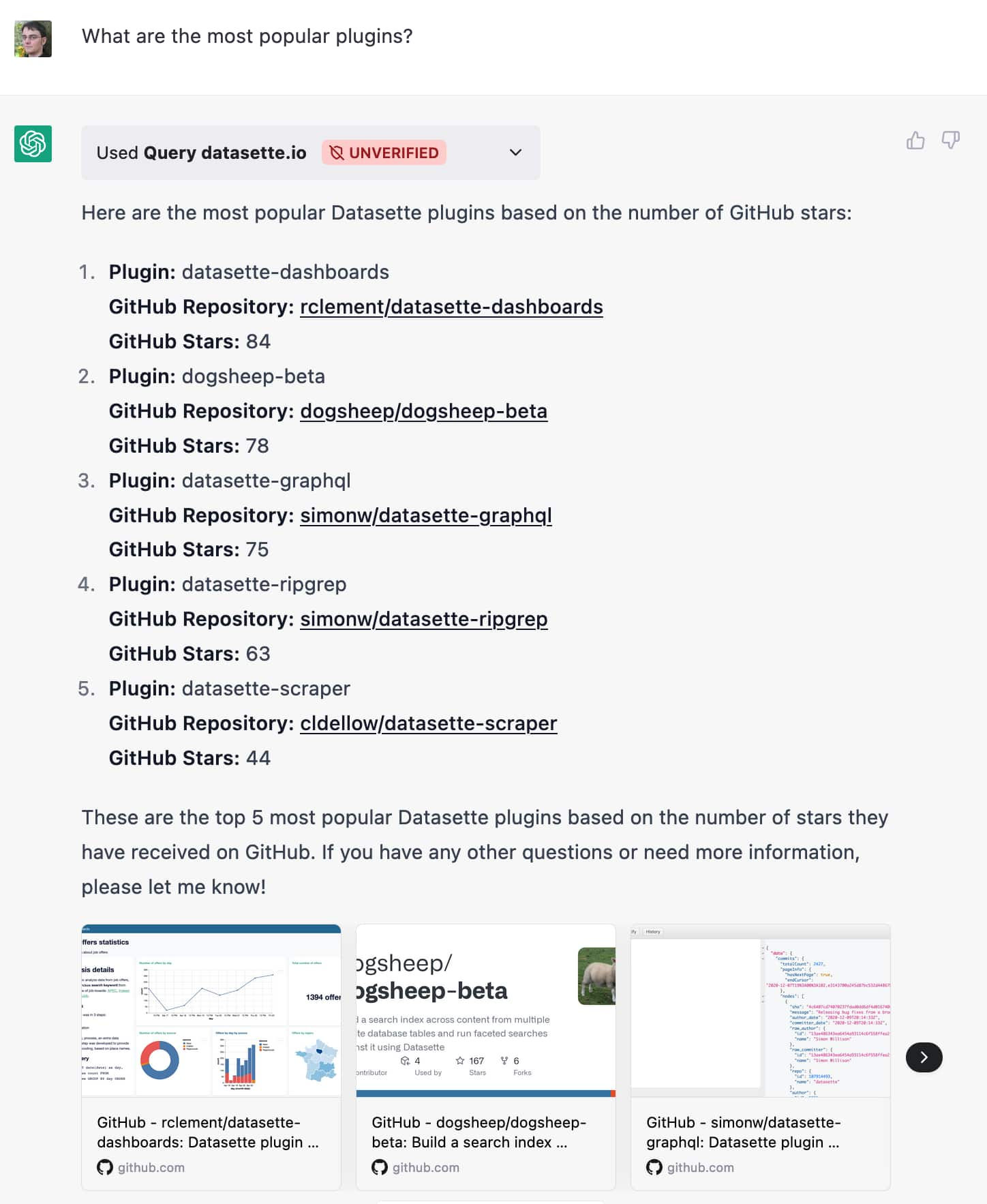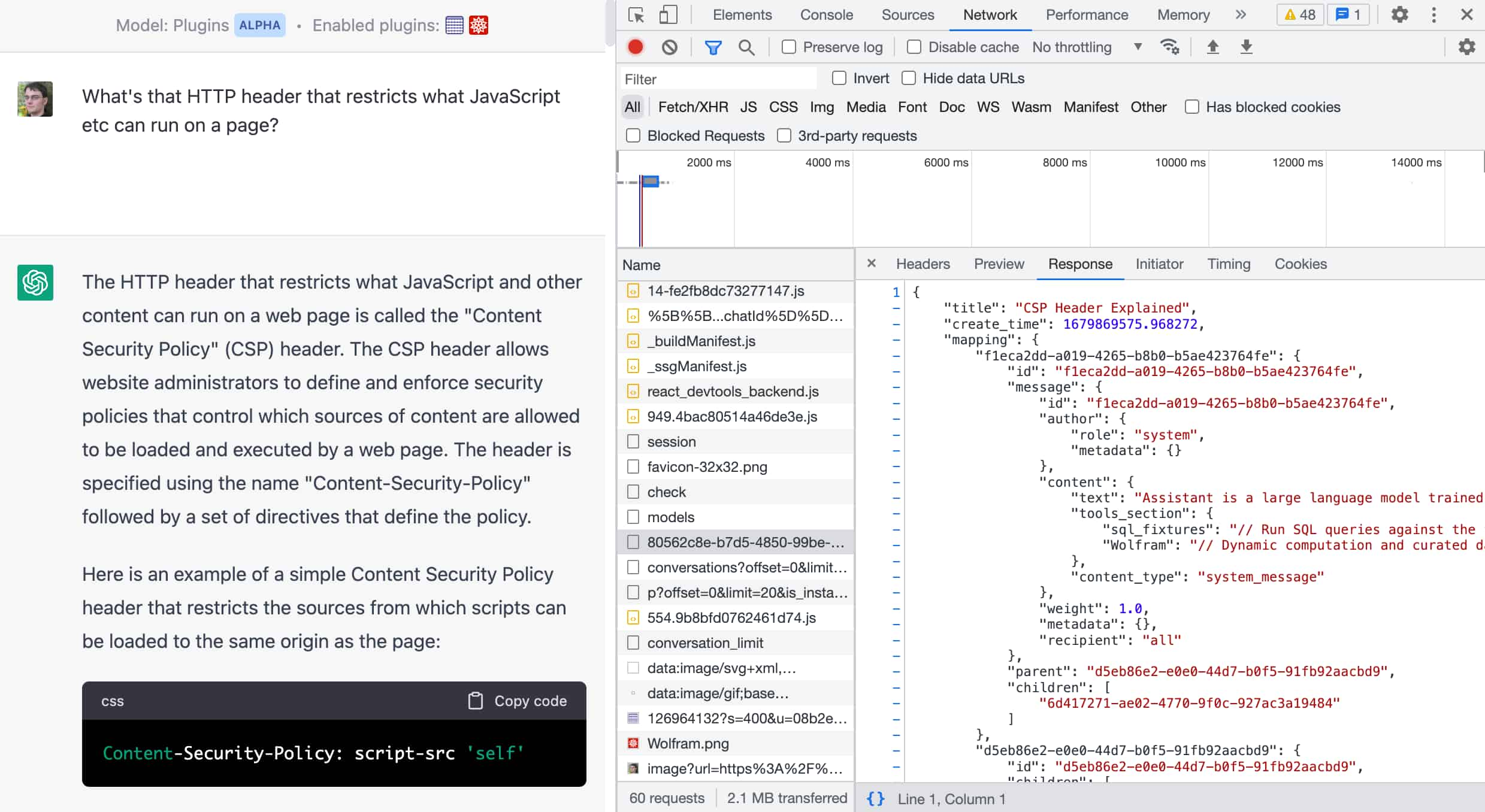March 2023
98 posts: 10 entries, 46 links, 20 quotes, 22 beats
March 22, 2023
Don’t trust AI to talk accurately about itself: Bard wasn’t trained on Gmail
Earlier this month I wrote about how ChatGPT can’t access the internet, even though it really looks like it can. Consider this part two in the series. Here’s another common and non-intuitive mistake people make when interacting with large language model AI systems: asking them questions about themselves.
[... 1,950 words]Datasette: Gather feedback on new ?_extra= design. I just landed the single biggest backwards-incompatible change to Datasette ever, in preparation for the 1.0 release. It’s a change to the default JSON format from the Datasette API—the new format is much slimmer, and can be expanded using a new ?_extra= query string parameter. I’m desperately keen on getting feedback on this change! This issues has more details and a call for feedback.
Weeknotes: AI won’t slow down, a new newsletter and a huge Datasette refactor
I’m a few weeks behind on my weeknotes, but it’s not through lack of attention to my blog. AI just keeps getting weirder and more interesting.
[... 1,255 words]March 23, 2023
If you ask Microsoft’s Bing chatbot if Google’s Bard chatbot has been shut down, it says yes, citing as evidence a news article that discusses a tweet in which a user asked Bard when it would be shut down and Bard said it already had, itself citing a comment from Hacker News in which someone joked about this happening, and someone else used ChatGPT to write fake news coverage about the event.
Teaching News Apps with Codespaces (via) Derek Willis used GitHub Codespaces for the latest data journalism class he taught, and it eliminated the painful process of trying to get students on an assortment of Mac, Windows and Chromebook laptops all to a point where they could start working and learning together.
mitsua-diffusion-one (via) “Mitsua Diffusion One is a latent text-to-image diffusion model, which is a successor of Mitsua Diffusion CC0. This model is trained from scratch using only public domain/CC0 or copyright images with permission for use.” I’ve been talking about how much I’d like to try out a “vegan” AI model trained entirely on out-of-copyright images for ages, and here one is! It looks like the training data mainly came from CC0 art gallery collections such as the Metropolitan Museum of Art Open Access.
ChatGPT plugins. ChatGPT is getting a plugins mechanism, which will allow developers to provide extra capabilities to ChatGPT, like looking up restaurants on OpenTable or fetching data from APIs. This feels like the kind of feature that could obsolete—or launch—a thousand startups. It also makes ChatGPT much more interesting as a general purpose tool, as opposed to something that only works as an interface to a language model.
ChatGPT Retrieval Plugin. “The ChatGPT Retrieval Plugin repository provides a flexible solution for semantic search and retrieval of personal or organizational documents using natural language queries.” How many existing startups were building this I wonder?
textra (via) Tiny (432KB) macOS binary CLI tool by Dylan Freedman which produces high quality text extraction from PDFs, images and even audio files using the VisionKit APIs in macOS 13 and higher. It handles handwriting too!
March 24, 2023
I built a ChatGPT plugin to answer questions about data hosted in Datasette
Yesterday OpenAI announced support for ChatGPT plugins. It’s now possible to teach ChatGPT how to make calls out to external APIs and use the responses to help generate further answers in the current conversation.
[... 1,801 words]Hello Dolly: Democratizing the magic of ChatGPT with open models. A team at DataBricks applied the same fine-tuning data used by Stanford Alpaca against LLaMA to a much older model—EleutherAI’s GPT-J 6B, first released in May 2021. As with Alpaca, they found that instruction tuning took the raw model—which was extremely difficult to interact with—and turned it into something that felt a lot more like ChatGPT. It’s a shame they reused the license-encumbered 52,000 training samples from Alpaca, but I doubt it will be long before someone recreates a freely licensed alternative to that training set.
SvelteKit is written in JS and distributed as source code — no build step — and it's been miraculous for productivity. build steps make sense for apps, they make much less sense for libraries
March 25, 2023
March 26, 2023
scrapeghost (via) Scraping is a really interesting application for large language model tools like GPT3. James Turk’s scrapeghost is a very neatly designed entrant into this space—it’s a Python library and CLI tool that can be pointed at any URL and given a roughly defined schema (using a neat mini schema language) which will then use GPT3 to scrape the page and try to return the results in the supplied format.
After three decades of working with software, I'm also seeing myself learning faster using ChatGPT. So apparently it works even for us more seasoned programmers.
Leicester balloon riot (via) In 1864 a test flight of a new hydrogen balloon in Leicester’s Victoria Park attracted 50,000 spectators, and ended in a riot that destroyed the balloon. “Early in the afternoon there was a disturbance when a gentleman, claiming to be an aeronaut, announced that Britannia was not Coxwell’s newest and biggest balloon but an older model. This enraged the crowd who, shortly after 2pm, broke down the barrier and demanded that Coxwell take off immediately.”
March 27, 2023
I lost everything that made me love my job through Midjourney over night. A poster on r/blender describes how their job creating graphics for mobile games has switched from creating 3D models for rendering 2D art to prompting Midjourney v5 and cleaning up the results in Photoshop. “I am now able to create, rig and animate a character thats spit out from MJ in 2-3 days. Before, it took us several weeks in 3D. [...] I always was very sure I wouldn’t lose my job, because I produce slightly better quality. This advantage is gone, and so is my hope for using my own creative energy to create.”
I think it’s likely that soon all computer users will have the ability to develop small software tools from scratch, and to describe modifications they’d like made to software they’re already using.
AI-enhanced development makes me more ambitious with my projects
The thing I’m most excited about in our weird new AI-enhanced reality is the way it allows me to be more ambitious with my projects.
[... 3,336 words]Every wave of technological innovation has been unleashed by something costly becoming cheap enough to waste. Software production has been too complex and expensive for too long, which has caused us to underproduce software for decades, resulting in immense, society-wide technical debt. This technical debt is about to contract in a dramatic, economy-wide fashion as the cost and complexity of software production collapses, releasing a wave of innovation.
Simple Push Demo (via) Safari 16.4 is out (upgrade to iOS 16.4 to get it) and the biggest feature for me is mobile support for Web Push notifications. This little demo tool was the first I found that successfully sent a notification to my phone: frustratingly you have to add it to your home page first in order to enable the feature. The site also provides a curl command for sending push notifications through the Apple push server once a token has been registered, which is the crucial step to figuring out how to build applications that can send out notifications to users who have registered to receive them.
LLaMA voice chat, with Whisper and Siri TTS. llama.cpp author Georgi Gerganov has stitched together the LLaMA language model, the Whisper voice to text model (with his whisper.cpp library) and the macOS “say” command to create an entirely offline AI agent that he can talk to with his voice and that can speak replies straight back to him.
March 28, 2023
By gaining mastery of language, A.I. is seizing the master key to civilization, from bank vaults to holy sepulchers.
What would it mean for humans to live in a world where a large percentage of stories, melodies, images, laws, policies and tools are shaped by nonhuman intelligence, which knows how to exploit with superhuman efficiency the weaknesses, biases and addictions of the human mind — while knowing how to form intimate relationships with human beings?
Announcing Open Flamingo (via) New from LAION: “OpenFlamingo is a framework that enables training and evaluation of large multimodal models (LMMs)”. Multimodal here means it can answer questions about images—their interactive demo includes tools for image captioning, animal recognition, counting objects and visual question answering. Theye’ve released the OpenFlamingo-9B model built on top of LLaMA 7B and CLIP ViT/L-14—the model checkpoint is a 5.24 GB download from Hugging Face, and is available under a non-commercial research license.
Cerebras-GPT: A Family of Open, Compute-efficient, Large Language Models (via) The latest example of an open source large language model you can run your own hardware. This one is particularly interesting because the entire thing is under the Apache 2 license. Cerebras are an AI hardware company offering a product with 850,000 cores—this release was trained on their hardware, presumably to demonstrate its capabilities. The model comes in seven sizes from 111 million to 13 billion parameters, and the smaller sizes can be tried directly on Hugging Face.
Quicker serverless Postgres connections. Neon provide “serverless PostgreSQL”—autoscaling, managed PostgreSQL optimized for use with serverless hosting environments. A neat capability they provide is the ability to connect to a PostgreSQL server via WebSockets, which means their database can be used from environments such as Cloudflare workers which don’t have the ability to use a standard TCP database connection. This article describes some clever tricks they used to make establishing new connections via WebSockets more efficient, using the least possible number of network round-trips.


